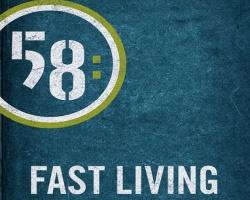Fast Living
Scott Todd
Compassion, 2001, 256 pp., $12.99
With all the literature out currently on the topics of service and social justice, it is difficult for to one that distinguishes itself from the rest of the pile, but I think Scott Todd has done so with his work in Fast Living.
His reimagining of the starfish story in chapter 1 is the key. Todd does a great job of explaining young people see the world and interpret how to interact with the world differently than adults. This difference is why they will undertake such sizeable causes as ending extremem poverty. Todd is focused on all the positives that have been expected from this upcoming generation of young people, but not in a naive way. He writes with an expectation that I’m afraid many–even in the church–do not have.
For me, the idea that really sticks from this book is in the comment that those living in poverty-stricken nations tend to see poverty as something that can be overcome and defeated, while those living prosperously in other nations tend to see it as the impossible dilemma. Perhaps those of us with resources at our disposal need to be more willing to get our hands dirty. This is the great appeal to the young generation right now.
They are not afraid, but more than that they are willing to go and do.
Their optimism is an even greater resource than any capital we could place in their hands. This is precisely why this book will be a great resource for youth ministries. We will use this book as a resource to prepare our young people for our mission trip this coming summer.
–Anthony J. Applegate, Youth and Family Minister, Brenham Church of Christ
In 58:Fast Living How the Church will end Extreme Poverty, Scott C. Todd brings the idea of extreme poverty to life by connecting with the reader in everyday language. He explores expectations, AIDS and making a difference one penny at a time. Todd shows how it is possible to end extreme poverty, and statistics show that steps are being taken to see that it happens. Now, we just need people to read this book and join the movement that could change our world forever. Fast Living would be a good book to study in groups because of its short chapters and easy-to-understand thoughts and ideas. A group study guide with discussion questions for each chapter would make the book group friendly. I think this book is for a group that is looking for more than just intellectual stimulation. It easily could be paired with a service project for a life-changing experience that group members won’t soon forget.
–Diana Henderson
This book makes a valid point. However, the beginning reads much like a research paper, using many statistics and quotes to prove the point. The middle of the book was more conversational and true-story type writing, which I found easier to understand. The title meant absolutely nothing to me, as I was not familiar with 58; though once I read it, I understood the Fast Living part of the title. The subtitle explains the book the best, in my opinion. Whether this is a book youth workers can use in their groups would be based on the age level, responsibility level, etc. of the group. It talks about getting youth involved, so extreme poverty can be eliminated in 25 years, but I think the book is a little heavy on stats and quotes to be of interest to most youth groups. The concept is a good one. Maybe the youth leader would read it and implement a plan? That could work.
–Pam Horton, NewDireictionLifeCoaching.com
Scott Todd’s 58: Fast Living is an eye-opening revelation. He reveals how we as Christians not only have the charge to end extreme poverty, but we have the ability to see it done. The knowledge and tools given in Fast Living will assist in preparing and engaging youth to help achieve this goal. Fast Living has fueled my desire to see extreme poverty come to an end, and I believe it can do the same with today’s youth.
–Jonathan Tripp
In the past year, in preparation for an international mission trip, I have done an extensive amount of reading on the church’s response to poverty, so much so that I began to feel as though few authors had anything new to say about this subject. As a result, I was somewhat skeptical about Scott C. Todd’s book, Fast Living: How the Church Will End Extreme Poverty, the premise of which is that it’s entirely possible for the church to end extreme poverty in the next 25 years.
In light of my skepticism, I was pleasantly surprised by Todd’s fresh voice and the fact that far more than a how-to book, Fast Living offers a sound theology of compassion and social justice. While not everyone will agree with this theology, most will find it at least thought-provoking and perhaps compelling. In particular, I found Todd’s chapters on fasting and his interpretation of what Jesus meant in
Even so, despite the book’s short chapters and general readability, it is not a book I would use directly with my students. Though Fast Living features several vignettes, it lacks an overarching story to engage students, who I fear would get lost in the somewhat overwhelming statistics which (while interesting) lose their effectiveness once their initial shock value dissipates. That said, I suspect this is a book I will return to often as a reference for teaching about and challenging my students to respond to poverty in the world around them.
–Jen Bradbury
###




